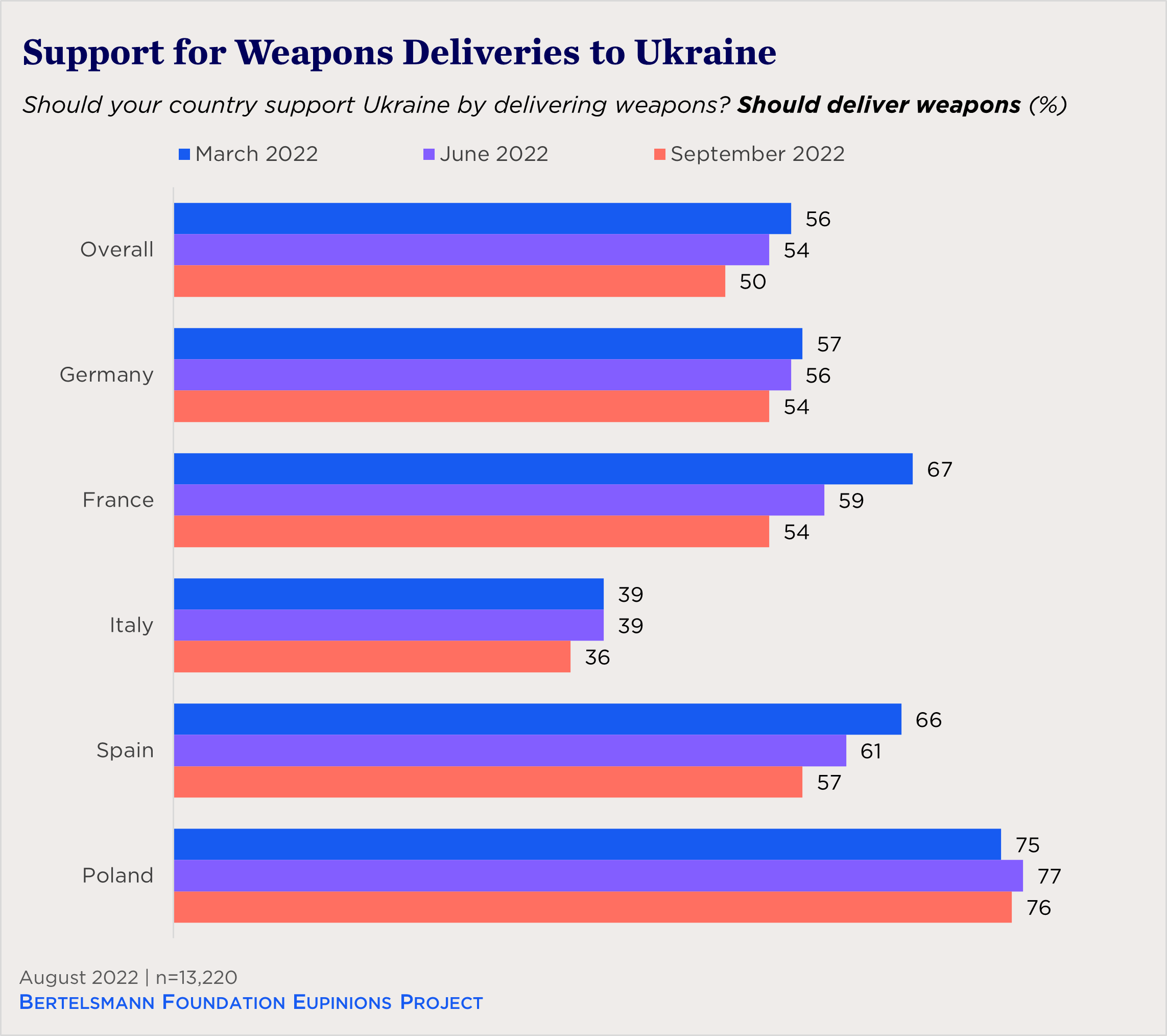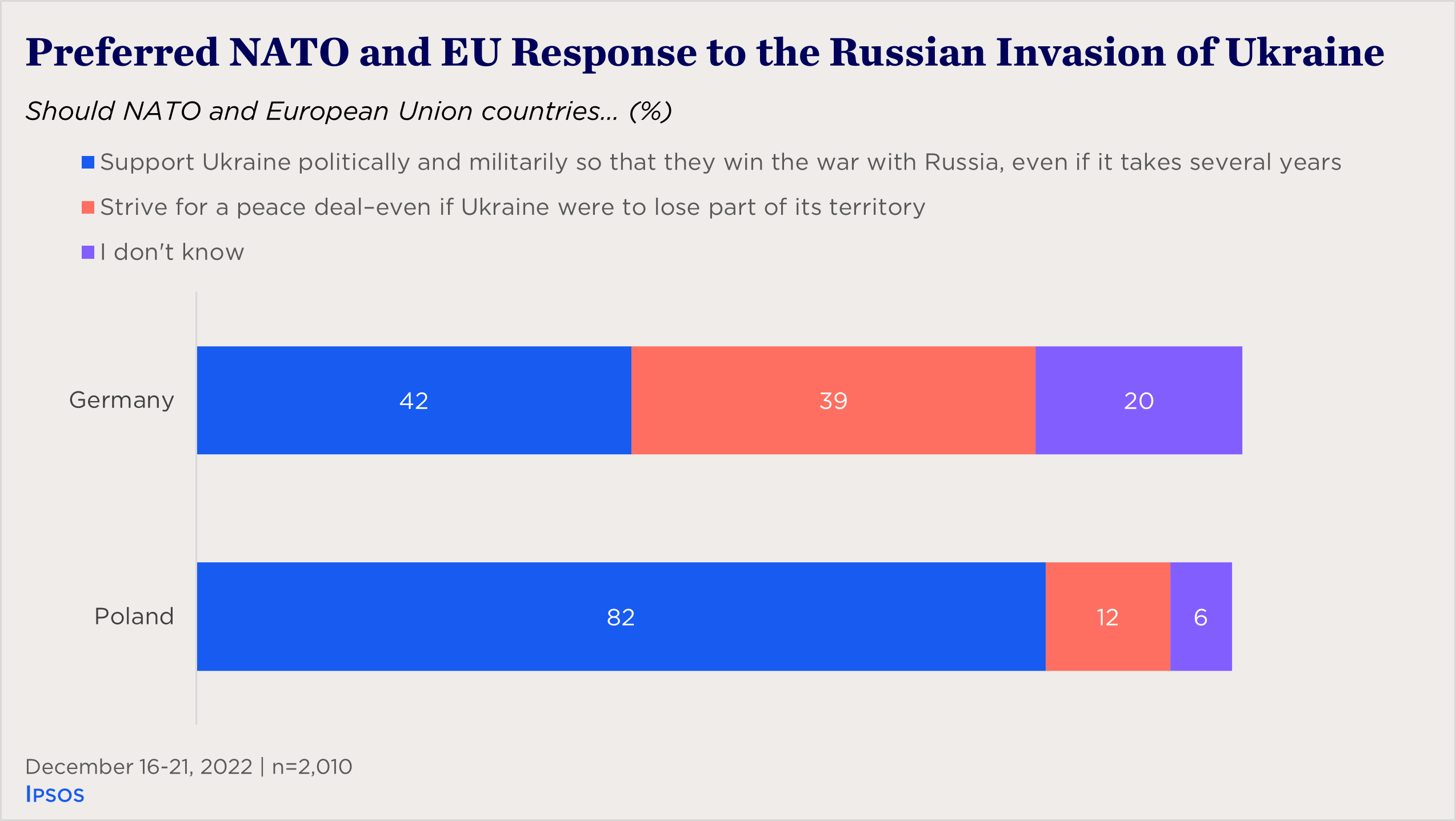Europeans Continue to Back Ukraine, But Disagree on the Endgame

In countries that favor a negotiated end to the conflict, support for specific policy measures that aid Ukraine has fallen.
After weeks of diplomatic wrangling, Germany agreed to send Leopard 2 tanks to Ukraine last month. But the debate highlighted growing divides among European states over support for Ukraine. While the governments of Poland and the Baltic states have backed strong military and financial support to Kyiv, for example, their counterparts in Germany and elsewhere have been more cautious about providing aid that they fear could escalate the conflict.
Do these divides extend to public opinion as well? Data from Eurobarometer, Ipsos, the Institut français d'opinion publique (IFOP), the Bertelsmann Foundation, Polish Public Opinion Research Centre (CBOS), and RTL-Forsa in late 2022 show that while Europeans remain strongly supportive of Ukraine as a whole, national publics have very different conceptions of how the war should end. In many countries where citizens prefer a negotiated end to the conflict, support for providing military aid to Ukraine, taking in Ukrainian refugees, and accepting Ukraine’s European Union membership bid have begun to ebb as the conflict drags on.
Europeans Strongly Support Ukraine, but Backing for Some Policies Is Waning
Nearly one year into Russia’s invasion, Europeans continue to strongly support Ukraine. The European Parliament’s Autumn 2022 Eurobarometer survey found that nearly three in four EU citizens (74%) approve of the European Union’s financial, military, and humanitarian support of Kyiv since the beginning of the conflict.
But the survey also shows persistent divides between national publics. Support for Ukraine is weakest in southeastern Europe, where less than half of Slovaks, Greeks, and Bulgarians approve of the “different actions taken by the European Union to support Ukraine since the start of the war.” This echoes earlier findings that publics in the northern half of Eastern Europe express much stronger support for Ukraine than in the south.
Furthermore, across most of the European Union, support for Ukraine and for policies that aid the country have declined somewhat since the onset of Russia’s invasion. IFOP’s Franco-German survey (conducted online from October 5-11, 2022) found that while 86 percent of German respondents had a positive opinion of Ukraine in March 2022, only 68 percent did in October.
Likewise, among French respondents, positive opinions fell from 82 percent to 70 percent. In both countries, support for Ukraine is highest within governing coalitions, with 91 percent of France’s Renaissance (President Emmanuel Macron’s political movement) and 83 percent of German center-left (SDP and Grüne supporters) expressing positive views of the country.
When it comes to specific policy measures that bolster Ukraine’s war effort, the Bertelsmann Foundation’s Eupinions project found that across the EU member countries, support for weapons deliveries fell by six points from March to September 2022. Among the EU’s five most populous countries, the drop was steepest in France (13 points), while the change in support was almost negligible in Poland. Greater declines in support among the French, Spanish, and other Western European publics have magnified differences with countries like Poland, where the public is generally more supportive of military aid.
While a majority of EU citizens still support weapons deliveries in most of the EU’s most populous countries, the Italian public is a notable exception: fewer than four in 10 (36%) agree. This echoes Italians' lower approval of the EU’s support of Ukraine. The finding could also reflect sympathies for Russia in some political quarters, as pro-Russia comments by Silvio Berlusconi, a former prime minister and leader of Forza Italia (the third-largest party in Italy’s governing coalition), vividly illustrated this week.

Across the EU, support for accepting refugees from Ukraine also fell from 86 percent to 77 percent between March and September, although a clear majority continues to support Ukrainian refugees in all of the EU’s largest states.
How Should the War End?
National publics may differ in their support for military aid because of disagreements on how the conflict should or will end. On one hand, in countries like Poland, the public wants to support Ukraine until it is victorious against Russia—even at significant cost. In December, an Ipsos phone and panel poll conducted for news outlets OKO and TOK FM found that more than four in five Poles (82%) believe that NATO and European countries should support Ukraine until they win the war against Russia, as opposed to striving for a peace deal at the possible expense of Ukrainian territory (12%). Poles’ willingness to continue supporting Ukraine may be due to growing optimism about Kyiv’s progress in the war. In its monthly in-person survey, the Polish Public Opinion Research Center (CBOS) found that only a quarter (26%) of Poles believed that Ukraine would need to give up territory or that Russia would subjugate the country in November 2022, compared to nearly half (47%) who said so in June.
On the other hand, many Western European publics (most notably in Germany and France) express more support for a negotiated solution. In the same Ipsos poll, a nearly equal proportion of Germans say they believe that NATO and EU countries should push for a peace deal between Ukraine and Russia (39%) as opposed to providing political and military support until the conflict is won (42%).

French respondents are particularly supportive of negotiations. The Institut français d'opinion publique (IFOP)’s December domestic poll finds that seven in 10 (70%) prefer to reach a negotiated solution, rather than continuing military aid until Ukraine is able to defeat Russia. But so far, both the Ukrainian government and opinion polls of the Ukrainian public have soundly rejected a negotiated outcome that includes territorial concessions. While the IFOP poll did not mention that a negotiated solution could involve the loss of Ukrainian territory, most theorized negotiations have involved a “territorial settlement” outside of Ukraine’s internationally recognized borders.
Europeans Favorable Toward EU Membership for Ukraine, but Support May Be Slipping
For Ukraine, gaining partners’ continued support for its defense is only half the battle. The Ukrainian government aspires to economic and political integration with Europe, with an ultimate goal of membership in the European Union. Since the EU granted Ukraine candidate status in June, Ukrainian leaders have sought to push forward the timeline—Prime Minister Denys Shmyhal raised eyebrows last month when he pressed for “a very ambitious plan to join the European Union within the next two years.” They are backed by the enthusiastic support of the Ukrainian public; the Kyiv International Institute of Sociology’s telephone survey of Ukraine-controlled areas finds that eight in 10 (81%) support EU accession.
EU citizens agree in principle. A May Eurobarometer survey found that two in three (66%) believe that Ukraine should join the EU “when it is ready,” including majorities in every member state except for Hungary. But the strength of opinion may not be as strong as it appears at face value; more respondents “tend to agree” (36%) than totally agree (30%).
Indeed, in some countries, support is more equivocal when Ukraine’s “readiness” to join the EU is taken out of the equation. RTL-Forsa polling in October 2022 shows that only 42 percent of Germans believe that “it would be right for Ukraine to join the European Union,” compared to 49 percent opposed. This support is falling too, having decreased from 55 percent in July. Such hesitance may explain why German (and other countries’) leaders have sought to downplay expectations on Ukraine’s EU bid since, with German Chancellor Olaf Scholz insisting that EU reform is a prerequisite to Ukrainian accession.
Solidarity and Ukraine’s Future
At the EU-Ukraine Summit earlier this month, European leaders proclaimed that they are “united in responding to Russia’s war of aggression against Ukraine.” EU citizens agree, strongly supporting Ukrainians in the defense of their country. At the same time, they disagree about the future—and fatigue about the war and its attendant costs to EU citizens has started to diminish support for weapons deliveries and refugee assistance. As Ukraine presses for more military assistance, its leaders may want to watch how publics in key partner countries respond. Their support may become harder to keep.


Related Content
 Public Opinion
Public Opinion
A majority of the US public continues to back current military and financial aid to Kyiv, recent polls find.
 Public Opinion
Public Opinion
Nearly half of Americans (47%) now say Washington should urge Kyiv to settle for peace as soon as possible.
 Public Opinion
Public Opinion
But those feeling an economic pinch are more likely to say that Moscow should enter peace negotiations.
 Public Opinion
Public Opinion
A slim majority think Moscow should open up negotiations, but it is unclear what they might be willing to concede.